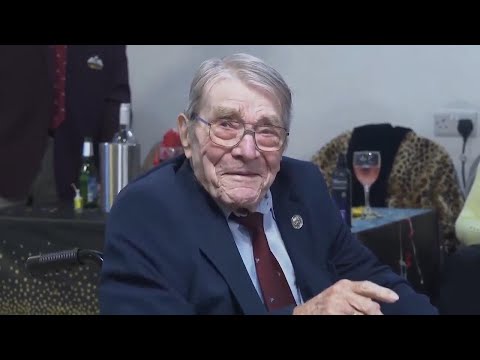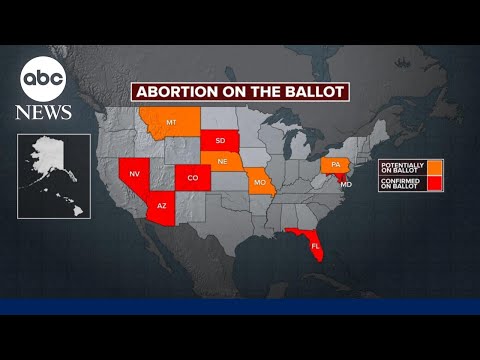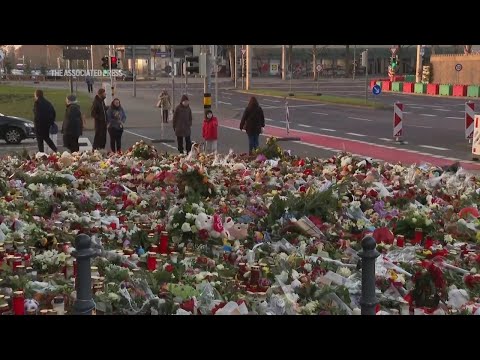(24 Apr 2024)
RESTRICTION SUMMARY:
ASSOCIATED PRESS
ARCHIVE: Haverhill, Suffolk, UK – 12 January 2024
1. Wide of British World War II veteran Bill Gladden entering surprise party to celebrate his 100th birthday, guest singing "Happy birthday" song
2. Close of Gladden waving hand to guest
3. Gladden reading card sent by King Charles III and Queen Camilla, UPSOUND (English): "We were so pleased to know that you are celebrating your 100th birthday on 13 January 2024"
4. Close of medals
5. SOUNDBITE (English) Bill Gladden, British World War II veteran:
"Well, I’m not 100% healthy but I always put it down to penicillin. I had millions of units of penicillin during my three years in hospital. I used to have penicillin in every way – tablets, medicine and injections. Anyway, it did the job."
6. Pull from portrait of Gladden in uniform, next to his wife, Marie’s portrait
ASSOCIATED PRESS
ARCHIVE: Biggin Hill, Greater London, UK – 12 September 2023
7. SOUNDBITE (English) Bill Gladden, British World War II veteran:
"Children, they’ll grow up and they’ll be in a position to say ‘no, we’re not going to have any wars.’ Because, although the war was won by the British and all the allies and all that, but it was a very expensive victory. I mean those young boys, 19, 20, lying in those cemeteries out there in France, what good did it do, no good whatsoever. I don’t want to see that happen again."
ASSOCIATED PRESS
ARCHIVE: Ranville, France – 5 June 2023
8. American World War II veteran speaking closely with Gladden, UPSOUND (English) Jake Larson, 100-year-old World War II Veteran:
“I want to give you a hug, thank you. I got tears in my eyes. We were meant to meet.”
9. Close of two veterans’ hands clasped
STORYLINE:
British army veteran Bill Gladden, who survived a glider landing on D-Day and a bullet that tore through his ankle a few days later, wanted to return to France for the 80th anniversary of the invasion so he could honor the men who didn’t come home.
It was not to be.
Gladden, one of the dwindling number of veterans who took part in the landings that kicked off the campaign to liberate Western Europe from the Nazis during World War II, died Wednesday, his family said. He was 100.
Although weakened by cancer, Gladden had been determined to make it back to Normandy to take part in this year’s D-Day commemorations. With fewer and fewer veterans taking part each year, the ceremony may be one of the last big events marking the assault that began on June 6, 1944.
“If I could do that this year, I should be happy,’′ he told The Associated Press from his home in Haverhill, England, in January, even as he celebrated his birthday with family and friends. “Well, I am happy now, but I should be more happy.”
Born Jan. 13, 1924, Gladden was raised in the Woolwich area of southeast London. His mother worked at the nearby Royal Arsenal during World War I and his father was a soldier.
He joined the army at 18 and was ultimately assigned to the 6th Airborne Reconnaissance Regiment as a motorcycle dispatch rider.
On D-Day, Gladden landed behind the front lines in a wooden glider loaded with six motorcycles and a 17,000-pound (7,700-kilogram) tank. His unit was part of an operation charged with securing bridges over the River Orne and Caen Canal so they could be used by Allied forces moving inland from the beaches.
Based in an orchard outside the village of Ranville, Gladden spent 12 days making forays into the surrounding countryside to check out reports of enemy activity.
Lying on the grass outside the hospital, he read the treatment label pinned to his tunic:
Find out more about AP Archive: http://www.aparchive.com/HowWeWork
Twitter: https://twitter.com/AP_Archive
Facebook: https://www.facebook.com/APArchives
Instagram: https://www.instagram.com/APNews/
You can license this story through AP Archive: http://www.aparchive.com/metadata/youtube/dc201923355d4b1cb0b26b5b0331e415






